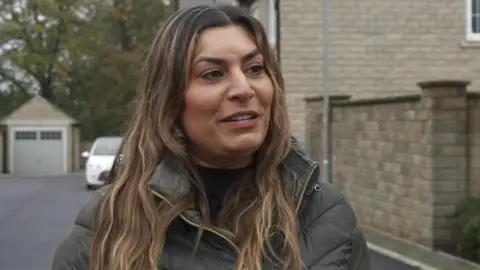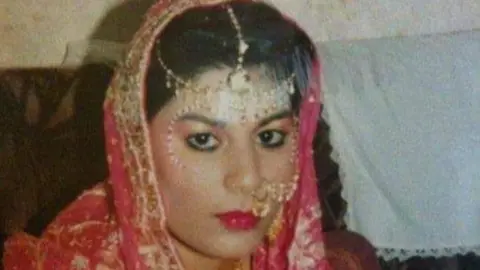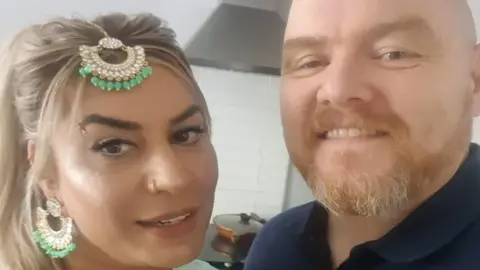'I was an Indian girl on drugs - who could I tell?'
 BBC
BBCThe co-founder of a group offering help to South Asian women with drug and alcohol issues says she wants to help remove the stigma around addiction.
Kim, 51, from Bradford, was addicted to heroin for 16 years before a traumatic assault prompted her to quit.
She said at the time of her dependency on drugs she had felt "embarrassed" with no-one to turn to and warned of the dangers of "hidden addiction".
Recovery charity BAC-IN said some black and Asian communities saw addiction as a "moral deficiency" and called for investment in culturally sensitive programmes.
Kim, who asked the BBC not to use her surname, said she became unknowingly hooked on heroin when, aged 22, she moved into a hostel with her two young children after leaving an arranged marriage.
She said she was regularly given cigarettes laced with the drug by a man she met there and only realised she was addicted when he left.
“I had no idea I was smoking drugs. I had never even had a sip of alcohol before," she said.
“I didn't know I was addicted for a few years because the habit was fed - if I was feeling rubbish, I didn’t connect it to withdrawals.
“Heroin was always provided, always there - until he left.”
After the man left, Kim, who by this time had a third child, said at one stage she photocopied her daughter’s school sponsorship form and walked around “the whole of Bradford” to get money for drugs.
She said her addiction spiralled until the point she voluntarily put her children, then aged one, eight and nine, into care.
“I felt like a failure and they deserved better than I could give them," she said.
“I kept in contact with them when I could, but they were away from me for six years.
“I had nothing to lose now - no kids, no home, I was sofa-surfing. I felt there was no way out.”
 Other
OtherShe said, at her lowest point, she felt unable to seek help.
“It was embarrassing. Who could I tell, who could I go to? For me, I was not just a drug user, I was an Indian girl on drugs.”
She said that the 2004 attack and a subsequent overdose of tablets prompted her to take action and she sought help from St Anne’s Community Services in Leeds.
The following year she was clear of heroin and slowly began rebuilding her life, finding a job and getting her children back.
Now working for St Anne’s she has also helped set up SAFIR (South Asian Females in Recovery) to help other women in her situation.
She said: “I think it was about time somebody spoke out. I do not know if I’m going to be appreciated for it or if it’s going to go down well, but I felt after all these years it needed to be out there that there is addiction that goes on in South Asian communities.”
 Other
OtherAccording to the All Party Parliamentary Group for the Treatment of Addiction in the UK, 92% of all people being treated for addiction were white.
Sohan Sahota, director of BAC-IN said the problem was that many black and Asian communities “won’t speak about it”.
“One of the main reasons is shame, cultural shame and family honour,” he said.
“Addiction is seen as a deficit, as a moral deficiency, as a weakness.
“It’s not seen as a real disorder that needs treating, that needs love and compassion.”
He said while “a small handful” of people from black and Asian communities were accessing mainstream services “they don’t stick around” because of a lack of understanding among support workers of the cultural issues they face.
“We need the right services, led by the community, but there is little investment.”
Kim has been free from heroin for 17 years and is engaged to her partner of nine years, Andy.
She works as a team manager for St Anne's and has three grandchildren.
She said addiction was not an easy subject to talk about and she did not want to bring a “negative spotlight” on the communities, but “hidden addictions kill people [so] let’s stop it”.
If you have been affected by any of the issues in this story please visit the BBC's Action Line website for help
Follow BBC Yorkshire on Facebook, X (formerly Twitter) and Instagram. Send your story ideas to [email protected].
